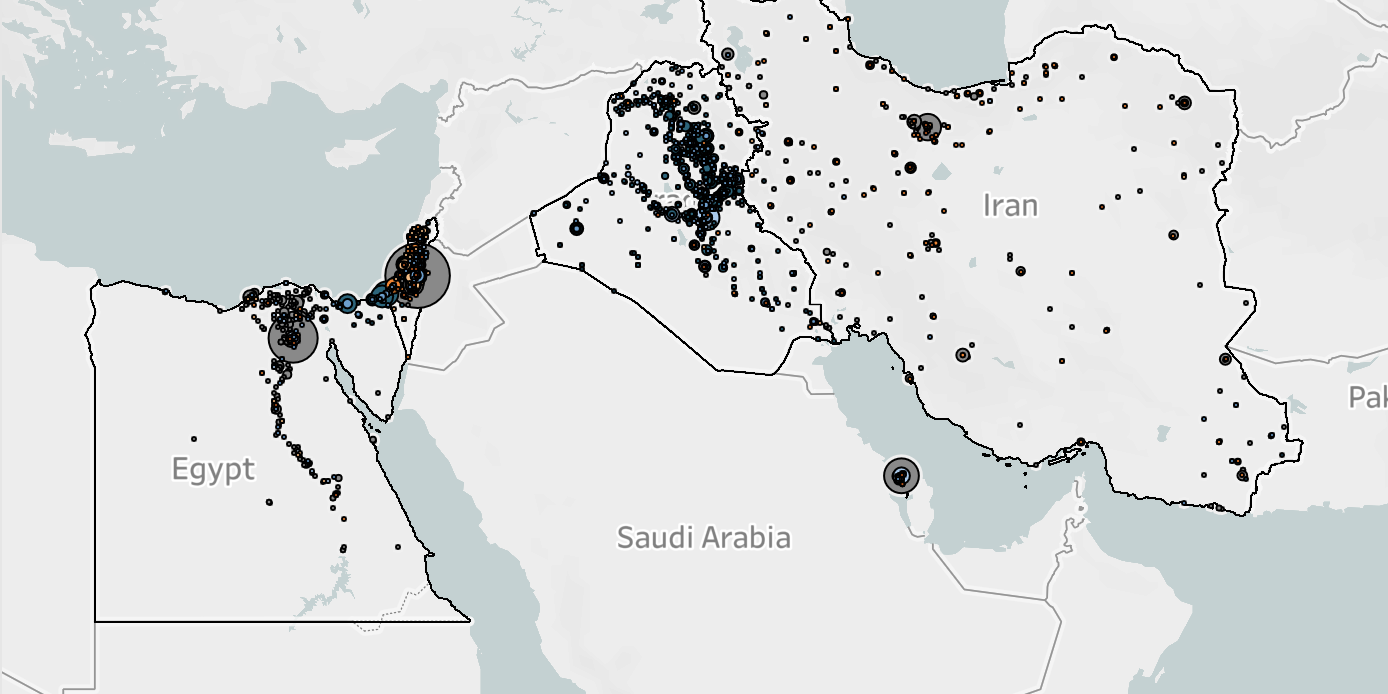Last week in the Middle East and North Africa, state authorities continued their repression of minorities and their imposition of state-sanctioned morality and religious norms. In Iran, the state continued its systematic persecution of non-Shiite religious minorities. In Egypt and Yemen, state authorities prosecuted individuals for deviating from the state’s interpretation of morality. In Israel and Palestine, Israeli religious settlers and citizens across the West Bank, Jerusalem, and Tel Aviv held protests calling for the restoration of the “Jewish character” of the state (Arutz Sheva, 8 February 2022). Meanwhile, tensions ran high in the West Bank as Israeli state authorities confronted settlers at the flashpoint site of the demolished Homesh outpost.
In Iran, the regime continued its systematic discriminatory policies against non-Shiite religious minorities last week, with Iranian judicial authorities summoning multiple Christian converts to serve terms of imprisonment. Two converts were summoned to Evin prison in Tehran to serve seven-years imprisonment on charges of “acting against national security by establishing a house church” and “propaganda against the state by the promotion of Christianity” (HRANA, 8 February 2022). Iranian authorities also summoned three Sunni clerics from Kurdistan and Sistan and Baluchestan provinces. Among them was a Sunni cleric and internal director of Anwar AlHarmain religious school in Pashamagh, Sistan and Baluchestan, who was summoned by the Special Clerical Court.1The Special Clerical Court is a special judicial body that handles crimes committed by Muslim clerics, regardless of their denomination. It is separate from the Iranian judiciary and is accountable only to the Supreme Leader of the Islamic Republic of Iran, a Twelver Shiite ayatollah (Tamadonfar, 2001). He was reportedly summoned after criticizing the arrest of the Sunni Friday prayer imam of Pashamagh, who was arrested in 2017 (Sunni News, 10 February 2022). In Kurdistan, Iranian Ministry of Intelligence forces summoned and interrogated a Sunni cleric from Sanandaj after his speech condemning the recent arrests of Kurdish citizens in Tangsir village (HRANA, 9 February 2022).
Last week in Egypt and Yemen, several events were reported in which the state authorities imposed their official interpretations of morality on their citizens. In Egypt, the Administrative Court upheld a decision by Helwan University to punish two students — a man and woman — over accusations of “indecency on campus” (Rosa El Youssef, 10 February 2022). Despite this, the court downgraded a previous decision to expel the two students, forcing them to instead repeat the university year. In Cairo, four women, including a lawyer, were arrested for accusations of running a “prostitution network” (El Fagr, 8 February 2022). In Banha, northeastern Egypt, a man and woman were also arrested for accusations of “practicing homosexuality” through the use of sex toys (Al Masry Al Youm, 5 February 2022). Since January 2020, ACLED-Religion records more than 300 judicial harassment events connected with the Egyptian regime’s efforts to control public morality, the vast majority of which relate to sex work.
Meanwhile, in Yemen, pro-Hadi security forces arrested a man last week after finding alcohol and hashish during a raid on his house in the southern province of Al Mahrah. Since the adoption of a constitution based on Sharia law in 1990, the consumption and sale of alcohol have been prohibited in Yemen (Middle East Eye, 1 November 2018). Another man was also arrested in Al Mahrah province on charges of “promoting drugs and prostitution” for taking a woman with him to a hotel (Aden Al Ghad, 10 February 2022). Pre-marital and extra-marital sex is illegal and considered socially unacceptable in the conservative Islamic country. It can result in prison sentences of up to three years in jail (The New Humanitarian, 17 November 2005).
In Israel and Palestine, on 8 February, demonstrators, including Israeli religious settlers, held protests across the West Bank, Jerusalem, and numerous Israeli cities calling for a “Jewish state” while raising the Israeli flag and chanting slogans against Palestinians. Protesters denounced what they referred to as the “distortion of the Jewish character of the state” due to the presence of the Islamic Raa’m party in Israel’s coalition government (Arutz Sheva, 8 February 2022).
Meanwhile, tensions continued to surface at the demolished Israeli settler outpost of Homesh last week. On 9 February, Israeli security forces demolished three illegal modular dormitories at Homesh, but left most of a yeshiva2A Jewish educational institution that focuses on the study of traditional religious texts, primarily the Talmud and the Torah, and halacha (Jewish law) (Chabad Online, 2022). situated at the site intact. The next day, hundreds of yeshiva students and rabbis held a protest against the actions of Israeli security forces, rejecting proposals for relocation made by Defense Minister Benny Gantz (News 0404, 10 February 2022). Homesh has been a flashpoint site since the killing of an Israeli yeshiva student and settler in December 2021 by a Palestinian assailant. The Homesh settlement was built on private Palestinian land at Burka village in 1978; after its demolition in 2005, the High Court upheld the rights of local Palestinians to farm that land (Jerusalem Post, 11 February 2022). However, for the past 15 years, a small number of Israeli religious settlers have occupied the outpost and illegally built a yeshiva, which has now become the primary site of contestation between the settlers and the Israeli state (Jerusalem Post, 9 February 2022).
All ACLED-Religion pilot data are available for download through the ACLED-Religion export tool. Explore the latest data with the interactive ACLED-Religion dashboard.
© 2022 Armed Conflict Location & Event Data Project (ACLED). All rights reserved.






